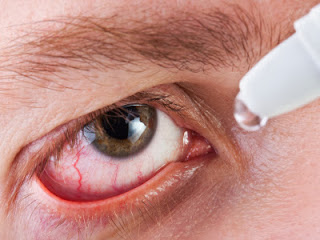Pink eye—the condition that causes itchy, infected, bloodshot eyes—is not only unpleasant to deal with but is also extremely contagious. Whether brought home from school by a child or passed around the office by a co-worker, anyone who catches pink eye should take extra care to avoid spreading it further.
What Is Pink Eye?
Pink eye, formally known as conjunctivitis, is inflammation and redness of the membranes that cover the whites of the eye and the inner eyelids. There are a number of causes of pink eye, with bacteria, viruses, and allergens, being the most common. But air pollution, chemical exposure, foreign materials in the eye, and improper wearing of contact lenses can all contribute to pink eye as well. That’s why it’s so important to follow the doctor’s instructions for taking out contact lenses every night! Pink eye caused by viruses and bacteria is highly contagious (which is why so many school-age children get it), but pink eye caused by environmental factors and eye irritants is not.
Preventing the Spread of Pink Eye
Pink eye is so contagious that it’s one of the most common reasons children miss school. According to the American Journal of Infection Control, more than 3 million school days are missed due to conjunctivitis annually. Anyone who goes to school or shows up to work with the condition risks quickly spreading it to the people around them, but some steps can be taken to prevent passing it on to others. After coming into contact with someone who is infected (or even with objects they’ve touched), hands should always be washed thoroughly with soap and warm water. People should be especially mindful of touching or rubbing their eyes, and parents or anyone else caring for someone with pink eye should wash their hands after helping apply eye drops, changing bedding, or coming into any physical contact with the affected person or their belongings.
Anyone who does get pink eye should frequently wash their hands or use hand sanitizer, especially immediately after touching their eyes. Glasses should be worn instead of contact lenses until cleared by a doctor, and no personal items, especially sunglasses, makeup, and pillows, should be shared. Swimming pools should also be avoided. Any discharge from the eye must be cleaned with washcloths or cotton balls that should then be washed or discarded. The affected person should avoid school or work for three to five days, if possible, to avoid spreading it to others while under treatment with antibiotics, eye drops, or ointments. Any items used while infected, like makeup, contact lens solution, and glasses, should be thrown away or thoroughly cleaned to avoid becoming re-infected.
At Excellent Vision, our main concern is the health of your eyes. We offer
ophthalmology and
optometry services at three convenient
locations around Portsmouth, New Hampshire to help our patients see more clearly. If you are experiencing symptoms of pink eye, call 603-430-5225 to schedule an appointment with
our doctors! We can help you review the steps you need to take to make sure your eye care products aren't delaying your recovery from this frustrating condition.
